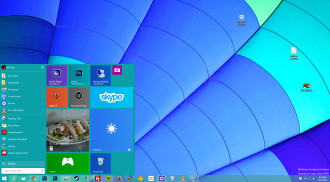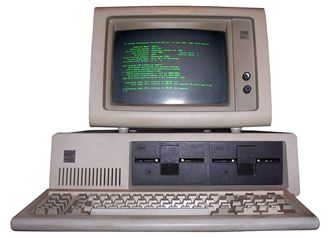Tag: techeye
Apple PCs make a dent in the marketplace
 While the conventional Windows PC market continues to decline, it appears to be losing market share to Apple’s range of PCs.
While the conventional Windows PC market continues to decline, it appears to be losing market share to Apple’s range of PCs.
Organisations anticipate internet of things
 Although there’s still a clear lack of standards with different vendors vying to take the lead, many organisations are getting ready for the internet of things (IoT).
Although there’s still a clear lack of standards with different vendors vying to take the lead, many organisations are getting ready for the internet of things (IoT).
Sony stumbling away from doom
![]() Electronics giant Sony appears to be pulling out of its death spiral.
Electronics giant Sony appears to be pulling out of its death spiral.
The consumer electronics firm said on Wednesday preliminary results showed that operating profit had doubled to $1.52 billion in the October-December quarter, while sales rose 6 percent.
This was well ahead of what the cocaine nose jobs of Wall Street expected and they rushed from their expensive loos screaming “buy, buy, buy.”
To be fair, the company is not home and hosed yet. In fact it could not even be said to be at the front gate contemplating a nice hot bath and a rigorous toweling down.
Sony also forecast a preliminary full-year net loss of $1,44,841,1900 but since this was better than the than its forecast last October estimating a net loss of $ 1,959,616,100 for the year no one appears to be quibbling.
The company had said it would delay announcing the official results for the third quarter as its Hollywood studio struggled to recover from a massive hacking of its computer systems. The company, in the midst of a restructuring, said on Wednesday its Chief Executive Kazuo Hirai would announce a “new business strategy” on February 18.
The company will cut 2,100 jobs in the unit by the end of the next fiscal year through March 2016, including around 1,000 cuts already announced.
Sony’s image sensors have emerged as one of its best performing product lines in recent quarters.
Comodo teams up with British partner VCW
 Certificate Authority and Internet Security outfit Comodo has signed a deal up with UK distributor VCW Security.
Certificate Authority and Internet Security outfit Comodo has signed a deal up with UK distributor VCW Security.
VCW Security now offers a range of Comodo’s endpoint security products including Endpoint Security Manager, Anti-Spam Gateway, UTM (Unified Threat Management) and Mobile Device Management (MDM).
Comodo’s Endpoint Security Manager provides security antivirus, firewall, host intrusion prevention, auto-sandbox and file rating to the desktop.
Simon Jackson, Commercial Director at VCW Security, said: “Comodo represents an opportunity for our valued partner network to offer a set of products that are genuinely innovative in the antivirus market – a market with virtually no innovation in the last years. The unique technology offered by Comodo is supported by its warranty – giving all users complete peace of mind.”
James Tomlinson, Channel Manager, Northern Europe at Comodo, added: “VCW Security has a wide range of experience in value added services through their extensive reseller networks. Comodo has a strong record of accomplishment of providing the best breed of high-tech products to the UK security industry. We are looking forward to working with them.”
ARM shows off new mobile chip
 British chip designer ARM Holdings unveiled a new processor aimed at better computing performance and beefed-up graphics for smartphones and tablets.
British chip designer ARM Holdings unveiled a new processor aimed at better computing performance and beefed-up graphics for smartphones and tablets.
We will not see the new Cortex-A72 processor hit the streets until next year but it is being touted as saving ARM’s bacon.
Investors are concerned about lower royalty rates for ARM as growth in the smartphone market shifts to China, where consumers typically buy devices priced at $200 or less, compared with more than $600 in the United States.
ARM licenses its processor technology to other semiconductor companies and receives its cash based on the selling prices of chips shipped by its partners.
On the technical side, ARM claims the new processor has 3.5 times the performance of comparable chips from 2014.
The chip design will also deliver a 75 percent reduction in energy use, helping reduce battery drain on smartphones, they claimed.
However, most of the advances depend on contract manufacturers like TSMC getting its 16nm process technology to higher yields.
Nandan Nayampally, ARM’s vice president of marketing, said with the Cortex-A72’s increased computing horsepower, smartphones and tablets will be able to handle complex computing like voice analysis without having to connect to the Internet.
Many compute-heavy tasks on smartphones today are handled remotely in data centres owned by Internet heavyweights like Amazon, Google and Facebook In instead of by the smartphone’s processor, with results instantly sent to the device.
Ten companies have licensed the new technology, including China’s Rockchip and Taiwan’s MediaTek, ARM said.
Samsung kicked in India
 Samsung is being pushed out of its key Indian market by a local budget smartphone maker Micromax.
Samsung is being pushed out of its key Indian market by a local budget smartphone maker Micromax.
Micromax has become the leading supplier in India’s booming smartphone market for the first time in the fourth quarter.
According to beancounters at research firm Canalys, New Delhi based Micromax accounted for 22 percent of smartphone sales in India in the October-December quarter, ahead of Samsung’s 20 percent. In total, 21.6 million smartphones were sold in India in the period, a 90 percent surge from a year earlier.
India, which has the world’s second-highest number of mobile phone accounts after China, is the third-biggest market by number of smartphones sold. Low-priced smartphones are the top sellers in a country where many buyers are upgrading from feature phones.
Micromax’s performance was partly due to its “continuing appeal to mobile phone users upgrading to smartphones,” Canalys said.
It estimated nearly a quarter of smartphones sold in India in the fourth quarter were devices priced under $100, while 41 percent of devices sold were in the $100-$200 range.
Micromax and Samsung were followed by two other Indian budget smartphone brands, Karbonn and Lava, by number of handsets sold in fourth quarter. Japan’s Sony Corp said its net annual loss will likely be smaller than previously forecast after cost cuts and higher-than-expected sales of its image sensors and PlayStation video game consoles helped its third-quarter profit beat estimates.
IBM is still planning huge lay-offs
 Despite denials from IBM that it is laying off more than 110,000 IBM employees, the hack who revealed the story for Forbes is standing by it.
Despite denials from IBM that it is laying off more than 110,000 IBM employees, the hack who revealed the story for Forbes is standing by it.
Rober Cringely ran a story that 110,000 IBM employees laid off and the ever shrinking Big Blue said it would be more like 8,000. However writing in his bog Cringely said that Big Blue is spinning.
“I think IBM is dissembling, fixating on the term 110,000 layoffs, which by the way I never used. Whatever the word, what counts is how many fewer people will be paid by IBM on March 1 compared to today,” he said.
He said his sources tell him that IBM has other ways of getting its workforce down rather than ordinary layoff. He claimed that IBM is pushing some people out using poor performance rathings.
This includes people who were on IBM’s “bridge to retirement’ program that took that option, thinking it kept them ‘safe’ from layoffs/firings.
“There is a loophole that says they can be dismissed for ‘performance’ reasons, which is exactly why many of my long-time, devoted, hardworking peers are suddenly getting the worst rating, a 3. It’s so they can be dismissed without any separation package and no hit to the RA, or workforce rebalancing, fund,” Cringely said.
It used to be something like 10 percent of employees ‘had’ to be labeled 3s, but recently IBM required an increase in number of 3s.
Cringely said IBM got rid of some employees by ‘stuffing’ them into the Lenovo x86 acquisition, shipping tons of people over there that never even worked on x86 stuff.
Lenovo has discovered this and has given some of them a way better package – year salary and benefits, and taking it up quietly with IBM, he added.
Still it would be hard to fire a quarter of your staff by the back-door in this way, but as Cringely said the 110,000 figure was not suggested in his original story.
Authentication market value to soar
 By the end of this year, mobile multi-factor authentication software and services will be worth $1.6 billion by the end of this year.
By the end of this year, mobile multi-factor authentication software and services will be worth $1.6 billion by the end of this year.
UCL claims optical fibre breakthrough
 Researchers at University College London (UCL) claim to have discovered a new method of processing fibre optic signals.
Researchers at University College London (UCL) claim to have discovered a new method of processing fibre optic signals.
Cisco makes bold wearable claims
 Networking giant Cisco believes that by the 2019 there will be half a billion people using wearable devices.
Networking giant Cisco believes that by the 2019 there will be half a billion people using wearable devices.
China internet users number 649 million
Lenovo pips Amazon at the tablet game
 Apple continued to be the market leader for tablets in 2014 but it, in common with other vendors, showed a drop in sales.
Apple continued to be the market leader for tablets in 2014 but it, in common with other vendors, showed a drop in sales.
Some analysts believe that not only has the market reached maturity, but it’s hard to persuade people to upgrade. Others think that tablets are being squeezed on the one hand by larger screen size smartphones and others by low cost notebook PCs.
Lenovo cleans up
 Despite a miserable year for the smartphone industry, Lenovo managed to do rather well and saw its third quarter revenue rise 31 percent to $14.1 billion.
Despite a miserable year for the smartphone industry, Lenovo managed to do rather well and saw its third quarter revenue rise 31 percent to $14.1 billion.
This beat what the cocaine nose-jobs of Wall Street expected as its mobile division sales more than doubled following its acquisition of Motorola.
Lenovo wrote a cheque for $2.91 billion for Motorola, the US handset brand with a long sales history in the United States and Europe, as part of an effort to diversify away from the shrinking PC market.
These results took into account two months of Motorola’s performance and Lenovo said Motorola sold more than 10 million handsets during the quarter for the first time.
This is good news as Lenovo has been having trouble in its home market of China. Xiaomi swept aside Lenovo in China but has largely avoided Western markets due to fears of intellectual property challenges.
The company is expected to make a comeback against Xiaomi in China by adopting its rival’s Internet distribution model. Lenovo in May signed a deal with e-commerce site JD.com and announced a subsidiary last month to sell smartphones and wearables exclusively online.
Under Lenovo, Motorola will re-enter the Chinese market and be distributed primarily online, Yang said.
Total sales from the mobile division leapt 109 percent to $3.39 billion, or a quarter of the company’s sales.
Lenovo said net profit was $253 million, down from $265 million a year prior due to ballooning expenses associated with closing two major acquisitions. The Beijing-based company also acquired IBM’s low-end server unit for $2.1 billion.
The results beat expectations of $13.71 billion in revenue and $200 million in net profit.
Lenovo continued to consolidate its hold on the PC market, reaching a record 20 percent share during the quarter with sales of $9.15 billion. Shipments rose five percent compared with a three percent decline in the broader industry, with growth particularly strong in Eastern Europe.
AT&T gets out off of its cloud
 While everyone seems to be rushing to get on the cloud, AT&T is downsizing its data centre operations.
While everyone seems to be rushing to get on the cloud, AT&T is downsizing its data centre operations.
The telco is apparently selling some of its data centres worth about $2 billion as it continues its streak of asset sales.
Apparently, AT&T is keen to get its debt loads down and pay off its credit card bill from last Christmas. It is all a rumour of course, and the story is based on leaks to The Wall Street Journal
Part of AT&T’s debt problems came because it had to bid high prices for spectrum. The company said it had spent close to half of the total bids in the record-setting $44.9 billion spectrum sale that concluded last week.
AT&T bagged 251 licences in the AWS-3 spectrum auction worth $18.2 billion. The company has also been investing to expand its footprint in Mexico to grow its business, as the US wireless market reaches saturation. It said last month it would buy bankrupt NII Holdings wireless business in Mexico for $1.875 billion.







